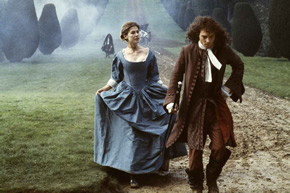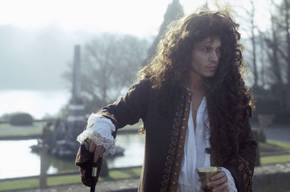|
Genre:
Drama
Director: Laurence Dunmore
Starring: Johnny Depp, Samantha Morton
RunTime: 1 hr 50 mins
Released By: GV
Rating: R21
Official Website: http://www.miramax.com/thelibertine/
Opening
Day: 27 July 2006
Synopsis
:
The
story of John Wilmot (Depp), a.k.a. the Earl of Rochester,
a 17th century poet who famously drank and debauched his way
to an early grave, only to earn posthumous critical acclaim
for his life’s work.
Movie
Review:
Johnny
Depp is, right at this moment, the biggest movie star in the
world. He’s a bona fide heartthrob, an alpha male and
has a practical and down to earth approach to his stardom.
He is also the bravest movie star in the world. Taking on
the odd roles, daringly contrary to his image. And he revels
in them while being refreshingly grateful for the opportunity
to perform them. After the thundering success of the first
Pirates of the Caribbean, he took on various roles including
but not limited to his memorable portrayals of Willy Wonka
in Charlie and the Chocolate Factory and Sir James Barrie
in Finding Neverland. These films were fated with the good
fortune of expeditious commercial releases, which was not
the case for The Libertine as it was plagued with financial
and distribution troubles early on. But finally, it has arrived
on our shores.
Depp
portrays The Libertine’s mainstay, the historical figure
of John Wilmot, the Second Earl of Rochester who was a sinner
compared even to the Marquis de Sade. Asking for a succinct
description would be complicated, but I will try. That said,
it is very much a companion piece to Jack Sparrow, sans the
absurdity. Also included is the minor and forgivable snag
of his tacky accent that sounds like it was straight out of
a Hallmark period piece. But therein lies sincerity in Depp’s
depiction of a brilliant but fundamentally flawed man who
reverberates the solitude and audacity felt in many of the
greatest talents the world had, including Marlon Brando, to
whom this film is dedicated.
A
scurrilous monologue of self-loathing sets the scene as the
film starts with an unusual warning. It’s almost as
if it sensed that our appreciation for Johnny Depp would hinder
our observation (even his character is dubbed Johnny in many
scenes) of his character’s dissolution of morality and
possibly even fail to encompass us in his role as the famous
rapscallion. He continues on by rhapsodising about the thrills
of sex and decadence, daring us to transcend the times and
ages to compare his rapturous experiences with ours. Although
it starts not at his birth but at the descent of his life,
it is important to know who the tragic Earl was.
Born
heir to the original Earl of Rochester, John Wilmot led a
prodigal life in the Age of Restoration (1647-1680). His father
was a staunch military man who believed that the monarchy
and God led the way. He became the new Earl when his father
passed on, and his courage in the military had brought him
many friends, including King Charles II (John Malkovich).
Wilmot also married Elizabeth Malet (Rosamund Pike), a wealthy
heiress he tried to abduct years before and who had gradually
fallen for him.
When
Charles II brought forth a new era in theatre by reinstating
women performers to the stage, Elizabeth Barry (Samantha Morton),
who’s now considered the foremost actress of the Restoration
Age, had caught the fancy of Wilmot. This triggers an act
of sedition towards the King that had cost him everything
and everyone. His reputation of debauchery with men and women,
his nihilistic tendencies and general perverseness also overshadowed
his own brilliance as a progressive writer and poet amidst
a decaying but still present Puritan backdrop. A staunch atheist
all his life, he died at age 33 from syphilis and a deteriorating
illness caused by alcohol, but not before renouncing his godlessness.
You
might ask, why the history lesson? Well, for the simple enough
reason that the film is just a mere shard of John Wilmot's
short life. It’s an insistent and incomplete shard no
less, which showcases the fleeting and less scoundrelly acts
of his eventual self-destruction. Being based on the play
by Stephen Jeffreys, it is also as true to the original idea
as it can be with Jeffreys also responsible for the streamlined
screenplay that culminates in the famous speech in Parliament
with Wilmot in his silver nose and pancake makeup covering
up his rotting skin. Although you can’t fault the material
it’s based on, you can fault its translation to the
screen. Gifted with talented actors, the director, Laurence
Dunmore shamefully manages to build such a shallow atmosphere
teeming with gags like smoke and shoddy, truncated editing
between key scenes. Having more to work with in film than
in theatre, he still creates an unfortunately superficial
and retrograded look at the genuinely interesting characters.
The
film does not belong just to Depp though. Its supporting case
is excellent and clearly got into the operatic style of the
script. There’s an impressive subtext of guilt demonstrated
in Rosamund Pike’s performance as the long-suffering
wife of Wilmot’s. Her vivid rage displayed at the end
to Wilmot was retching, and telling of the part she played
in his downfall. The grimy, grainy quality of the cinematography
seems a throwback to silent movies with its grayish tint and
dim lensing. This decision, although initially strident, ultimately
enhances the squalid and seedy encounters he has with his
harlots and prurient cohorts. Interestingly, there’s
an air of contempt for puritanical decency in the film. Almost
ridiculing the idea by lifting up a tragic and victimised
caricature of a man whose life was spent trying to circumvent
these societal blockades while citing the nebulous misery
that lays outside the brothels and indeed, the ungrateful
spectre of love itself.
Movie
Rating:
   
(Great
performances all round, coupled with an intriguing story of
a tragic figure in history)
Review
by Justin Deimen
|



